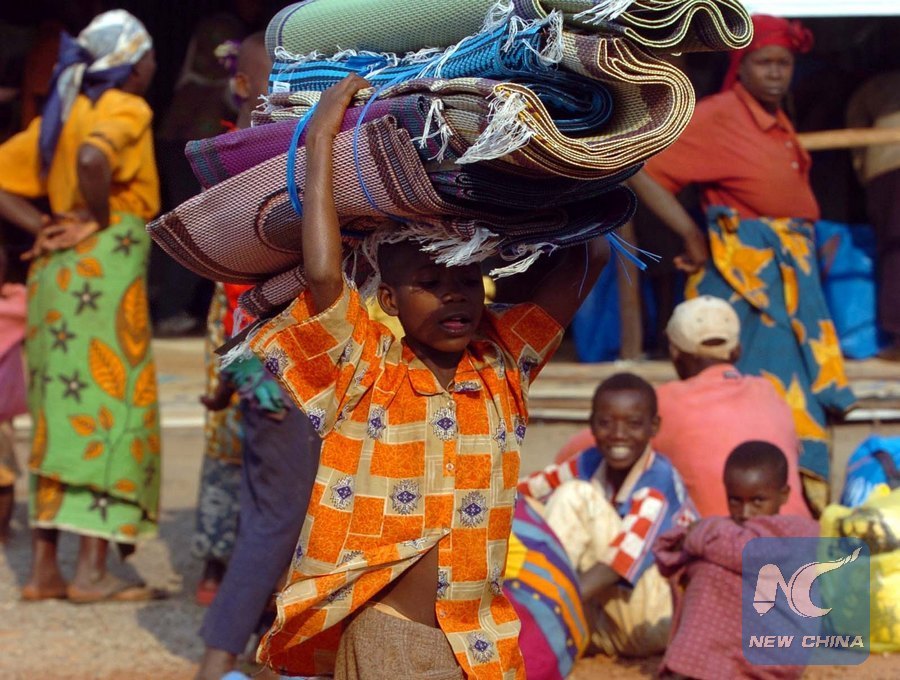
File photo shows a Burundi refugee carries mats for his family at the UN Makamba refugee transit center on the Burundi-Tanzania border August 26, 2005. (Xinhua Photo/Yang Lei)
DAR ES SALAAM, Sept. 1 (Xinhua) -- The UN refugee agency will next week start repatriating about 12,000 Burundian refugees sheltered in Tanzania's western region of Kigoma, a tripartite meeting between Tanzania, Burundi and the UN High Commissioner for Refugees (UNHCR) agreed on Thursday.
A statement issued at the end of the one-day 19th tripartite meeting in the east African nation's commercial capital Dar es Salaam said the refugees who have volunteered to return home will be repatriated from September 7 through December.
The meeting chaired by Tanzania's Minister for Home Affairs Mwigulu Nchemba requested the World Food Programme (WFP) to provide food for the returning refugees in Burundi for three months beginning September.
The meeting also appealed to the international community to provide necessary support for the voluntary repatriation process including support for the local communities in Burundi.
Nchemba said the government was not forcing the Burundian refugees to return to their country explaining that the refugees had volunteered to go back home on their own volition.
"No one has forced them to get back to their country. They have been self-motivated and what Tanzania is doing is to facilitate their safe return home," said Nchemba.
He said Tanzania was aware that the situation in Burundi was stable and allowed for the voluntary repatriation of the refugees.
Chansa Ruth Kapaya, the UNHCR Country Representative for Tanzania, thanked the governments of Tanzania and Burundi for their joint interest and keenness to respond to the request by the refugees to be assisted to return voluntarily to Burundi.
Kapaya also appreciated the hospitality and generosity of the government of Tanzania which has been host to thousands of refugees since its independence in 1961.
Today Tanzania hosts some 350,000 refugees and asylum seekers, of whom 256,850 have arrived from Burundi since April 2015.
On July 20, President John Magufuli called on the Burundian refugees now in the country to return home voluntarily and help build their country, asserting that now there was security in the tiny central African country.
Magufuli's remarks were in support of an earlier plea by Burundian president Pierre Nkurunziza, who had called on his fellow countrymen to go back home and help rebuild their country because the "war is over."
Magufuli also took a swipe at international humanitarian bodies for trying to convince refugees not to return to their home countries because of continued insecurity, just so they can continue receiving aid from donors.
The president also directed the Ministry of Home Affairs not to grant citizenship to any more Burundian refugees coming into Tanzania.
In June, the UN refugee agency said Tanzania remained the largest host of Burundian refugees.
Tanzania is currently home to more than 315,000 refugees and asylum-seekers, mainly from Burundi and the Democratic Republic of the Congo. They are hosted in three refugee camps of Nyarugusu, Nduta, and Mtendeli, which face severe pressure.
On Sunday, the United Nations World Food Programme (WFP) appealed for 23.6 million U.S. dollars from now through to December this year to be able to continue meeting the food and nutritional needs of refugees in Tanzania.
The world's largest humanitarian agency fighting hunger worldwide said in a statement that it has been forced to reduce food rations for 320,000 refugees in Mtendeli, Nduta and Nyarugusu Camps in northwest Tanzania as a result of funding shortfalls.
WFP provides refugees, primarily from Burundi and the Democratic Republic of the Congo, with five food commodities of maize meal, pulses, super cereal, vegetable oil and salt.
"Due to funding shortages, all five commodities were reduced for the August distribution, reaching only 62 percent of the 2,100 required kilocalories which is the recommended daily calorie intake," said the statement.
"Without an immediate response from donors, further ration cuts will be necessary as food stocks are simply running out," said WFP Tanzania Country Representative Michael Dunford.

